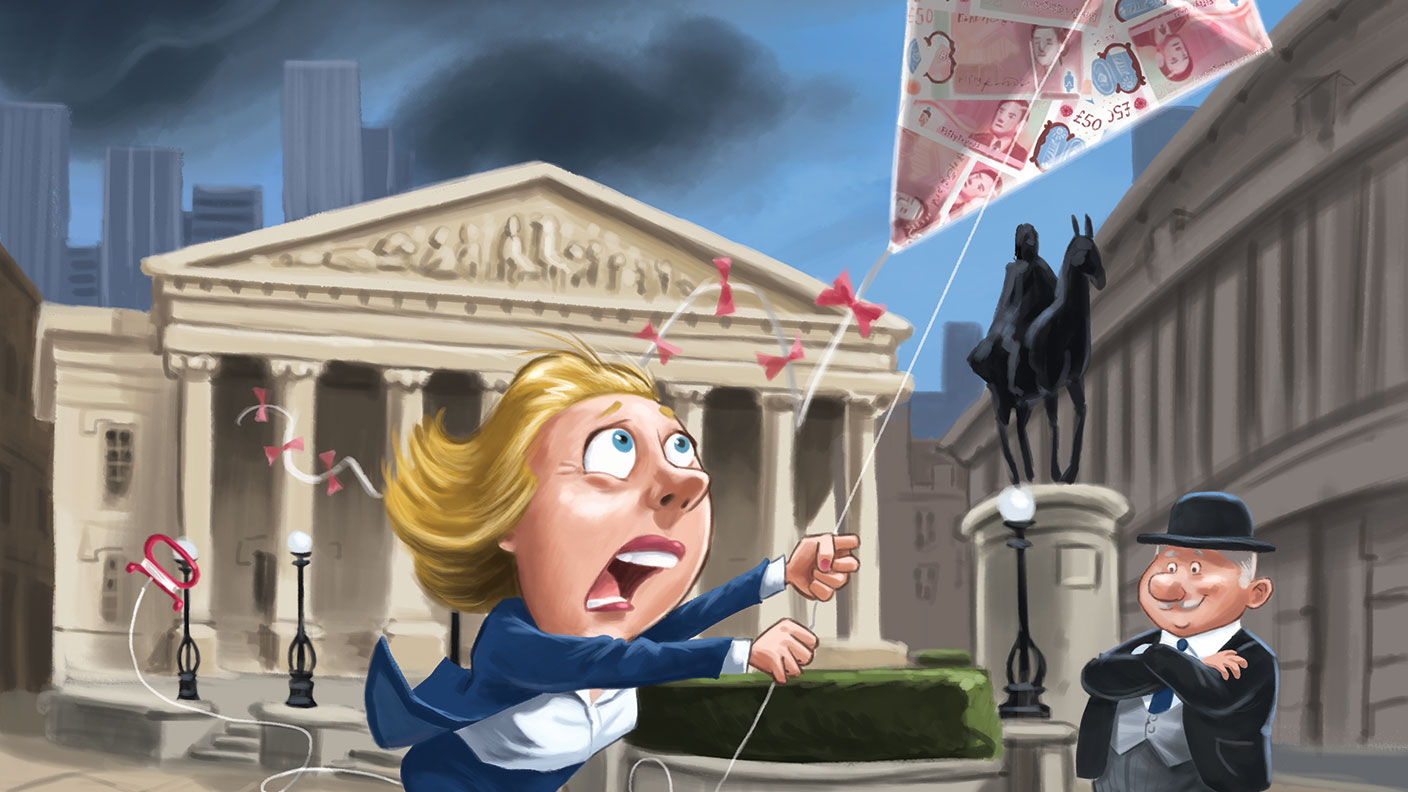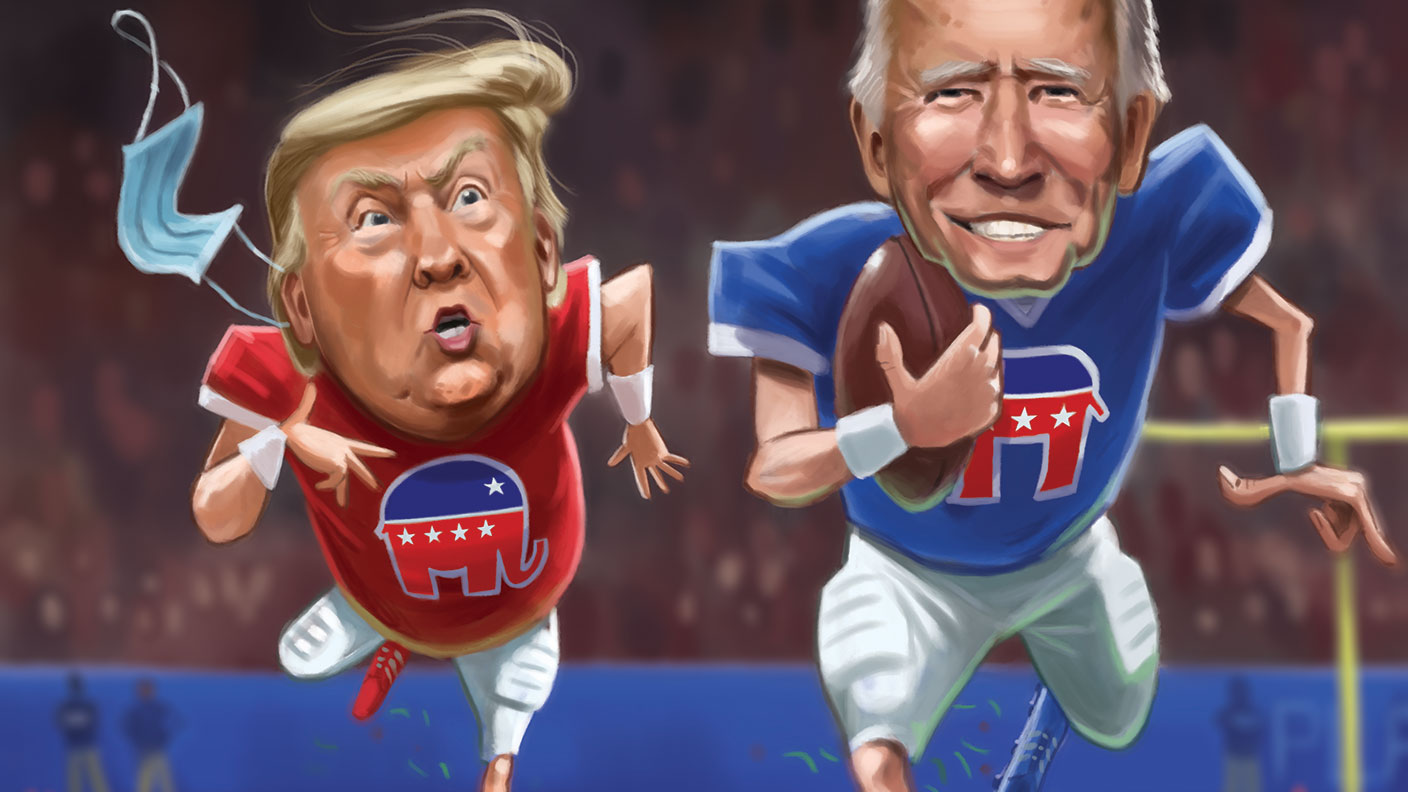Why you should keep buying broken China
The renminbi has dropped and markets are jittery – but a great long-term buying opportunity for Chinese equities lies ahead, says Rupert Foster.

Get the latest financial news, insights and expert analysis from our award-winning MoneyWeek team, to help you understand what really matters when it comes to your finances.
You are now subscribed
Your newsletter sign-up was successful
Want to add more newsletters?

Twice daily
MoneyWeek
Get the latest financial news, insights and expert analysis from our award-winning MoneyWeek team, to help you understand what really matters when it comes to your finances.

Four times a week
Look After My Bills
Sign up to our free money-saving newsletter, filled with the latest news and expert advice to help you find the best tips and deals for managing your bills. Start saving today!

The renminbi has dropped and markets are jittery but a great long-termbuying opportunity for Chinese equities lies ahead, says Rupert Foster.
The 11th of August saw the dawn of a new currency regime in China. The first day saw the renminbi (or yuan) fall by 1.9% against the US dollar, the largest daily move in more than a decade. Markets reacted nervously.
Was this the start of a larger devaluation (10%-plus)? Was it a panic move by China's leadership, designed to boost exports? Had the government givenup on its efforts to shift the Chinese economy from investment-led to consumption-led? Was this China's opening salvo in the global currencywar that has raged since 2008?
MoneyWeek
Subscribe to MoneyWeek today and get your first six magazine issues absolutely FREE

Sign up to Money Morning
Don't miss the latest investment and personal finances news, market analysis, plus money-saving tips with our free twice-daily newsletter
Don't miss the latest investment and personal finances news, market analysis, plus money-saving tips with our free twice-daily newsletter
By the end of day two the renminbi had fallen by a further 1.9% and the markets were more fevered than ever. Had China's central bank the People's Bank of China (PBOC) lost control? Were we facing a rerun of the 1997 Asian currency crisis? Investment banks circulated long lists of US-dollar-denominated Chinese corporate debt, to reveal who would take the hardest hit first.
On Thursday, the PBOC felt obligated to do that very un-Chinese thing of holding a press conference to explain a policy decision. And in more traditional Chinese manner, it intervened aggressively inthe currency market to halt the slide.
By Friday we returned to normal service a day of almost zero volatility in the currency and a sense of zen-like calm. Chinese markets fell again earlier this week, but the renminbi remained stable.
The truth about the falling renminbi
So what should we make of these events? The PBOC argued that the devaluation was designed merely to correct the pent-up misalignment of the exchange rate the renminbi needed to fall by 3% against the US dollar. This seems far-fetched at best. Micro-managing currencies like this is pointless no-one can be sure of the "fair value" of a currency to within a margin of 3%.
All we can say is that the renminbi has, along with the US dollar, strengthened by at least 15% in the last year against a whole raft of currencies belonging to China's production rivals, notably the Japanese yen. This has made Chinese exports less attractive to foreign particularly American buyers.
So it seems far more likely that the PBOC used the strong renminbi, along with the mostly unrelated slowdown in Chinese exports (which is really due toa slowdown in global growth), and also the likely increase in US rates in thenext 12 months, as an argument to convince China's government to drive through a necessary long-term reform. While China's political leaders are committed to long-term reforms, in the shorter run they also want to keep the economy buoyant and crucially hold down unemployment (various recent indicators have suggested it is rising).
So I'm sure that in his conversations with other members of the State Council last month, PBOC governor Zhou Xiaochuan stressed that the change in exchange-rate policy would benefit export demand and thus help with the unemployment rate.
The tricky thing is that for China's politicians reform is always unnerving, because it goes hand in hand with a loss of control. They are constantly walking a tightrope. The Chinese economy needs more market-led reform to allow it to shift to the consumption-led economic model that will create continued wealth for the Chinese people and their leaders are fully aware that their continued residence in power is founded on their ability to improve living standards for China's population.
But all of their historical experience and training points to the need for absolute control. As a result, the less reform-minded leaders end up in the unhappy position of trying to work out what is the slowest pace of reform they can get away with, while allowing for the successful progression of their economy.
For this section of the leadership, last week's exchange-rate reform became necessary,if frightening.The biggest concern for the leadership now is the risk that the new regime might lead to a noticeable devaluation of the renminbi. This in turn would mean a commensurate loss of confidence in the Chinese economy and the state, resulting in money fleeing its shores.
In the last year, $800bn has left China. This is dwarfed by the PBOC's $3.6trn of foreign currency reserves. But China's total deposits are vastly in excess of $3.6trn so any real loss of confidence would see the PBOC's reserves quickly swamped. The other frightening thing for these leaders is that one reform leads to another once it starts, reform must be progressed resolutely, or all could be lost. China's leaders are well aware of this, but it does not make each weakening of their power base any easier.
Two vultures with one arrow
The PBOC's stated desire to get the Chinese renminbi accepted into the International Monetary Fund's Special Drawing Rights (SDR see page 36) basket could very possibly seem a little esoteric for the less economically savvy of the Chinese leadership. However, they are very aware of the perceived risks of short-term economic weakness. So this may well have seemed a good opportunity to kill two birds with one stone or as the Chinese say "one arrow, two vultures".
The PBOC for its own part has made very plain its desire to see a reform of the renminbi exchange-rate mechanism.The last three State Council meetings have expounded the need to "strengthen the RMB exchange rate two-way floating flexibility". And in what looks like a pre-arranged comment, the IMF stated on Wednesday that the change was a "welcome step". The renminbi's inclusion in the SDR has previously been described by the IMF as a "when, not if" situation, so we must presume that the "when" is now nearer.
The benefit for China of this inclusion is mostly related to status and is a measurable step towards the renminbi becoming a new reserve currency for the world (a key leadership long-term goal). In short, this shift in exchange-rate policy is part of a long-term reform plan and recent weak export data makes now a convenient time to push it through.
The move is bad news for Chinese firms with non-renminbi borrowings (thought to be around $1trn in total), as this makes those debts more expensive to repay. It's also bad for importers into China, notably global commodity players and, to a lesser extent, luxury brands. That said, on the latter, a proposed cut in import taxes on luxury goods arriving in China is far more significant (it means a 10%-20% cut in prices) than this exchange-rate move (4%).
There's also the chance that other Asian countries will retaliate we've seen early signs of this, with Vietnam moving to devalue the dong.Overall, this announcement is good news for those who believe that the Chinese leadership is committed to reform.
The more such announcements are made, the less likely a genuine reversal of reform becomes. Confidence in China from foreign investors remains low after the mishandling of the Shanghai stockmarket correction, but after this announcement, a correction in Western markets feels a greater risk to Chinese equities around the world than a total collapse in the Chinese economy.Note that, while China's industrial sector has slowed this year, there is no sign of a sudden slump.
The looser monetary policy initiated late last year takes longer to take effect in China than in Western economies, but it is starting to feed through. The property market is turning sales volumes in the largest 44 cities in China rose by 34% in the first half of 2015, compared to 2014. Meanwhile, Vanke, the leading property developer, reported earnings last week.
Land acquisition was up 92% on last year, and construction starts up 5.2%. We are in the early stages of a new property cycle. In short, I remain a buyer of Chinese equities with the autumn likely to prove a wonderful long-term buying opportunity.
Rupert Foster has been a pan-Asian equities fund manager for the last20 years.
Four ways to buy into China's long-term bull market

As we outlined in our previous China story in June, writes Matthew Partridge, Chineseshares can be divided into two broad groups: "A" shares, listedin mainland China itself, and those on exchanges outside China,such as Hong Kong and even the London Stock Exchange,writes Matthew Partridge. The second group is often referred toas "H" shares, "S chips", and so on.
There are still restrictionson foreign investors buying "A" shares and Chinese investorsbuying foreign stocks, so the two groups often behave verydifferently. So when you consider investing in China (and asRupert suggests, now is a good time to consider your options),you need to be clear on which shares you want to buy.
There is a growing number of "A" share exchange-traded funds(ETFs), such as the MSCI China A GO UCITS ETF (LSE: CASH),which tracks the MSCI China A index, or the db x-trackersHarvest CSI 300 China A-Shares ETF (LSE: ASHR). These arerelatively expensive for ETFs, with ongoing fees of 0.88%and 0.80% per year respectively, but both physically hold theshares, rather than using derivatives to gain exposure. Activelymanaged funds are now taking advantage of the opportunitiesprovided by rule changes.
While we've previously been criticalof the Fidelity China Special Situations (LSE: FCSS) investmenttrust, the fund has performed much better under its newmanager, Dale Nicholls. Just under a third of its holdings arenow in "A" shares, with plans to expand this even further. It hasan annual management charge of 1%, although a performance relatedfee and other costs have pushed this up to 1.46%. Itcurrently trades on a wide discount to net asset value.
First State Greater China Growth Fund is another wayto get broad exposure to China it's managed by the highlyregarded Martin Lau, and invests in companies in Hong Kongand Taiwan, as well as those from mainland China.
Get the latest financial news, insights and expert analysis from our award-winning MoneyWeek team, to help you understand what really matters when it comes to your finances.
Rupert is an investment strategist and adviser at J & C Foster, providing Asian, Consumer and Global Equities Strategy advice to a number of family offices and portfolio management organisations. He writes on Asia and Global Macroeconomics for a number of investment publications including MoneyWeek and HL Investment Times.
-
 Should you buy an active ETF?
Should you buy an active ETF?ETFs are often mischaracterised as passive products, but they can be a convenient way to add active management to your portfolio
-
 Power up your pension before 5 April – easy ways to save before the tax year end
Power up your pension before 5 April – easy ways to save before the tax year endWith the end of the tax year looming, pension savers currently have a window to review and maximise what’s going into their retirement funds – we look at how
-
 Governments will sink in a world drowning in debt
Governments will sink in a world drowning in debtCover Story Rising interest rates and soaring inflation will leave many governments with unsustainable debts. Get set for a wave of sovereign defaults, says Jonathan Compton.
-
 Why Australia’s luck is set to run out
Why Australia’s luck is set to run outCover Story A low-quality election campaign in Australia has produced a government with no clear strategy. That’s bad news in an increasingly difficult geopolitical environment, says Philip Pilkington
-
 Why new technology is the future of the construction industry
Why new technology is the future of the construction industryCover Story The construction industry faces many challenges. New technologies from augmented reality and digitisation to exoskeletons and robotics can help solve them. Matthew Partridge reports.
-
 UBI which was once unthinkable is being rolled out around the world. What's going on?
UBI which was once unthinkable is being rolled out around the world. What's going on?Cover Story Universal basic income, the idea that everyone should be paid a liveable income by the state, no strings attached, was once for the birds. Now it seems it’s on the brink of being rolled out, says Stuart Watkins.
-
 Inflation is here to stay: it’s time to protect your portfolio
Inflation is here to stay: it’s time to protect your portfolioCover Story Unlike in 2008, widespread money printing and government spending are pushing up prices. Central banks can’t raise interest rates because the world can’t afford it, says John Stepek. Here’s what happens next
-
 Will Biden’s stimulus package fuel global inflation – and how can you protect your wealth?
Will Biden’s stimulus package fuel global inflation – and how can you protect your wealth?Cover Story Joe Biden’s latest stimulus package threatens to fuel inflation around the globe. What should investors do?
-
 What the race for the White House means for your money
What the race for the White House means for your moneyCover Story American voters are about to decide whether Donald Trump or Joe Biden will take the oath of office on 20 January. Matthew Partridge explains how various election scenarios could affect your portfolio.
-
 What’s worse: monopoly power or government intervention?
What’s worse: monopoly power or government intervention?Cover Story Politicians of all stripes increasingly agree with Karl Marx on one point – that monopolies are an inevitable consequence of free-market capitalism, and must be broken up. Are they right? Stuart Watkins isn’t so sure.
